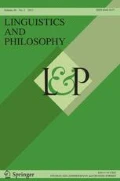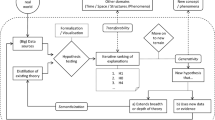Abstract
In this paper I present experimental data showing that the interpretation of donkey sentences is influenced by certain aspects of world knowledge that seem to elude introspective observation, which I try to explain by reference to a scale ranging from prototypical individuals (like children) to quite marginal ones (such as railway lines). This ontological cline interacts with the semantics of donkey sentences: as suggested already by the anecdotal data on which much of the literature is based, the effect of world knowledge is by and large restricted to donkey sentences with non-intersective determiners. I outline a psychological model which incorporates both ontological and logical factors, and suggest that there may be something wrong with the standard assumption that a statement's receiving a truth value requires that it have a definite reading.
Similar content being viewed by others
REFERENCES
Barker, C.: 1999, 'Individuation and Quantification', Linguistic Inquiry 30, 683–691.
Chierchia, G.: 1992, 'Anaphora and Dynamic Binding', Linguistics and Philosophy 15, 111–183.
Chierchia, G.: 1995, Dynamics of Meaning, University of Chicago Press.
Clark, H. H.: 1974, 'Semantics and Comprehension', in T. Sebeok (ed.), Current Trends in Linguistics, 12. Mouton, The Hague, pp. 1291–1428.
Conway, L. and S. Crain: 1995, 'Donkey Anaphora in Child Grammar', in J. N. Beckman (ed.), NELS 25, University of Massachusetts, Amherst.
Cooper, R.: 1979, 'The Interpretation of Pronouns', in F. Heny and H. Schnelle (eds.), Selections from the Third Groningen Round Table, Academic Press, New York, pp. 61–92.
Ericsson, K. A. and H. A. Simon: 1984, Protocol Analysis: Verbal Reports as Data. MIT Press, Cambridge, Mass.
Fine, K.: 1982, 'Acts, Events and Things', in W. Leinfellner, E. Kraemer, and J. Schank (eds.), Language and Ontology: Proceedings of the Sixth International Wittgenstein Symposium, Vienna, pp. 97-105.
Geach, P. T.: 1962, Reference and Generality, Cornell University Press, Ithaca, NY.
Geurts, B.: 1999, Presuppositions and Pronouns, Elsevier, Oxford.
Gupta, A. K.: 1980, The Logic of Common Nouns, Yale University Press, New Haven.
Heim, I.: 1982, The Semantics of Definite and Indefinite Noun Phrases, Ph.D. thesis, University of Massachusetts, Amherst.
Heim, I.: 1990, 'E-type Pronouns and Donkey Anaphora', Linguistics and Philosophy 13, 137–178.
Horn, L. R.: 1989, A Natural History of Negation, Chicago University Press.
Just, M. A. and P. A. Carpenter: 1971, 'Comprehension of Negation with Quantification', Journal of Verbal Learning and Verbal Behavior 10, 244–253.
Just, M. A.: 1974, 'Comprehending Quantified Sentences: The Relation between Sentencepicture and Semantic Memory Verification', Cognitive Psychology 6, 216–236.
Kadmon, N.: 1990, 'Uniqueness', Linguistics and Philosophy 13, 273–324.
Kamp, H.: 1981, 'A Theory of Truth and Semantic Representation', in J. A. G. Groenendijk, T. M. V. Janssen, and M. B. J. Stokhof (eds.), Formal Methods in the Study of Language, Mathematical Centre Tracts 135, Amsterdam, pp. 277–322.
Kamp, H.: 1991, 'Uniqueness Presuppositions and Plural Anaphora in DTT and DRT', in M. Stokhof, J. Groenendijk, and D. Beaver (eds.), Quantification and Anaphora, Part 1, DYANA deliverable R2.2A, ILLC, University of Amsterdam.
Kanazawa, M.: 1994, 'Weak vs. Strong Readings of Donkey Sentences and Monotonicity Inference in a Dynamic Setting', Linguistics and Philosophy 17, 109–158.
Krifka, M.: 1990, 'Four Thousand Ships Passed Through the Lock: Object-induced Measure Functions on Events', Linguistics and Philosophy 13, 487–520.
Krifka,M.: 1996, 'Pragmatic Strengthening in Plural Predications and Donkey Sentences', in T. Galloway and J. Spence (eds.), Proceedings from Semantics and Linguistic Theory (SALT) VI, Cornell University, Ithaca, NY, pp. 136–153.
Lappin, S.: 2000, 'An Intensional Parametric Semantics for Vague Quantifiers', Linguistics and Philosophy 23, 599–620.
Meyer, D. E.: 1970, 'On the Representation and Retrieval of Stored Semantic Information', Cognitive Psychology 1, 242–300.
Parsons, T.: 1978, 'Pronouns as Paraphrases', Ms., University of Massachusetts at Amherst.
Rooth, M.: 1987, 'Noun Phrase Interpretation in Montague Grammar, File Change Semantics, and Situation Semantics', in P. Gärdenfors (ed.), Generalized Quantifiers: Linguistic and Logical Approaches, Reidel, Dordrecht, pp. 237–268.
Strawson, P.: 1950, 'On referring', Mind 59, 320–344.
Van der Does, J.: 1993, 'The Dynamics of Sophisticated Laziness', in J. Groenendijk (ed.), DYANA Deliverable R22A, ILLC, University of Amsterdam. [Reference as given by Chierchia (1995).]
Wason, P. C.: 1961, 'Response to Affirmative and Negative Binary Statements', British Journal of Psychology 52, 133–142.
Yoon, Y.-E.: 1994, Weak and Strong Interpretations of Quantifiers and Definite NPs in English and Korean, Ph.D. Dissertation, University of Texas at Austin.
Yoon, Y.-E.: 1996, 'Total and Partial Predicates and the Weak and Strong Interpretations', Natural Language Semantics 4, 217–236.
Author information
Authors and Affiliations
Rights and permissions
About this article
Cite this article
Geurts, B. Donkey Business. Linguistics and Philosophy 25, 129–156 (2002). https://doi.org/10.1023/A:1014624331450
Issue Date:
DOI: https://doi.org/10.1023/A:1014624331450




